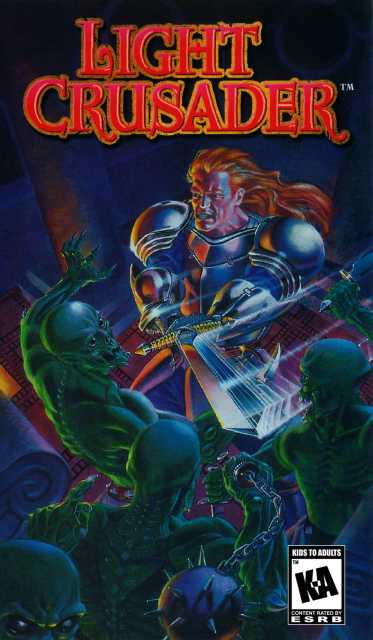A "Treasure"
Light Crusader is the name of a sacred sword created as the only method to banish an evil that formerly lay dormant. If that reminded you of the Legend of Zelda series, well so too will the game that shares its origins and namesake; Light Crusader is an isometric hobby grade action adventure RPG with real time combat and puzzle solving.
You play as David, a blond haired knight/dude who has been sent by his King to help his King’s brother’s village. The people of Green Row are disappearing, and you are sent to get to the bottom of it. To the bottom of one long dungeon specifically; while each floor is separate in theme and usually requires you to fight a boss before it, there is no overworld – rather, there is the castle and its’ town and the dungeon. More like a statically generated Diablo than Zelda in this regard.
In a reversal from their role in the Elder Scrolls IV: Oblivion, the Mages Guild have embraced evil and necromancy, and are collecting the townsfolk in order to revive the demon Ramiah. You must set free the villagers along the way to confront them in order to stop their plans. (I don’t actually know if saving the villagers impacts the game in any way. I seem to have rescued them all.)
Light Crusader’s greatest hindrances seem to be a result of it being isometric. This is Treasure at their best artistically, pushing the Genesis to the brink (again) with multi-layered sprites that remain a marvel to look at today. They are masters of making 2D appear 3D; in a game that is entirely rendered in a sort of pseudo-3d however, the seams become apparent upon examination. The game’s many platforming and puzzle sequences are fundamentally flawed as the player can never quite know which layer they are on. This is forgivable in context of the hardware, but of course brings the game down objectively now looking back. It can take some getting used to.
What is hard to excuse in any context is the portion of the games puzzles that are hint driven. You must always be listening and making notes, or a substantial amount of the game cannot be overcome. A small number of puzzles in the Zelda series are faulted this way, but it makes this game so much less accessible in that you’ll need a notepad or walkthrough to make progress - as opposed to Zelda’s many puzzles that can be solved on their own, without retaining knowledge of an obscure hint. Granted, it never gets as obscure as something like Simon’s Quest, and the info comes from a competent translation. But it is a major issue and surely prevented the game from achieving classic, highly recommendable status.
The soundtrack is at times both wholly and not quite remarkable. The castle music, which you’ll hear as soon as you start the game, sounds exactly like the sound designer set out to make a generic medieval castle tune. Then when you enter some of the castle’s strange looking side rooms, you hear what may be the most haunting atmospheric sounds produced on a Genesis sound chip. Upon leaving the castle, you’ll notice that the village music is uniquely somber and melodic. This hit-or-whatever dichotomy pervades the entire soundtrack, but overall the positives strongly outweigh the negatives.
If the seemingly basic fantasy theme turns you off, there’s a twist late in the game that may appeal to fans of time travel. While short-lived, seeing the knight completely out of place in a different time period is something to behold, and after experiencing the game as a whole, that and many other moments make it impossible to criticize this game for a lack of creativity. Like the the board game section in Treasure's other (more famous) game Gunstar Heroes, this is one of the most astounding and creative moments I've experienced in a video game. Hopefully this doesn't spoil either of them for someone.
The gameplay is similar in a couple ways to Gunstar Heroes; you can combine elements to create unique spells depending on the combination in a manner similar to the elemental weapons system in GH. The manner in which David can dive attack his opponent from across the screen is reminiscent in a way of the former game’s fluid, manic action. Without these touches the combat would otherwise be very basic hack and slash, but as a result of Treasure’s modus operandi at work, the combat is a standout among competitors in the “Zelda-like” action adventure game.
Light Crusader is a too often overlooked game. It has some incredible ideas that are executed well, but is held back by issues plaguing its very framework. In 1995, it was a celebrated developer’s last technical feat on a console that was soon to be replaced. In 2016, it is a curiosity in those terms, which must be accepted in order for it to be enjoyed. If you don’t mind struggling with finicky puzzles, using a walkthrough or taking notes, I can recommend Light Crusader. As a whole, it is an inventive game that is worth experiencing. With that in mind, I regret to say that it falls short of greatness. It is a shame that these issues were never addressed in a successor; in over 20 years, Treasure has never since made another game in this vein. I hold out hope that the idea is still in the back of someone’s mind in their office today.

0 Comments